Are you still using the old-fashioned method of developing lead lists for sales?
You’re just waiting around for leads to perform a marketing action (like downloading an e-book) so you can gather their contact information.

You’re getting covered in the proverbial competitor dust.
Don’t believe me?
Gartner’s 2020 buyer intent research found that buyers are spending half their time finding information from third-party sources.
In other words, buyers have purchase intent long before they reach your website.
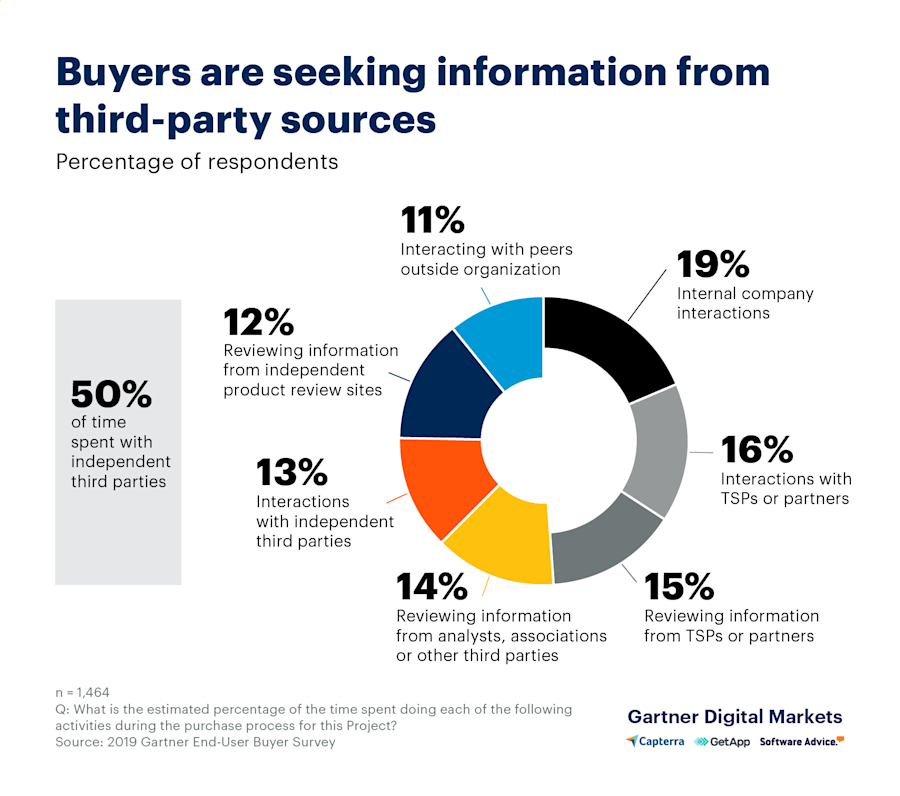
While consumers are collecting their purchasing data, you have the opportunity to start gathering information about them in return.
What you’re finding is known as buyer intent data — or data that expands on traditional purchase intent information to provide valuable insight before any action occurs.
The “sit-and-wait” tactic for lead generation has outgrown its usefulness. You’re losing potential customers to competitors every day you do nothing.
So, how do you access this “buyer intent data” to start outpacing the competition and develop marketing strategies that convert?
The answer is simple: you need a visitor tracking tool like Leadfeeder.
To help you better understand the Leadfeeder platform, I’m going to go over:
What Leadfeeder is
11 dope ways to use Leadfeeder for sales teams
11 dope ways to use Leadfeeder for marketing teams
What the heck is Leadfeeder?
Are you sitting down? Because what you’re about to read is going to be life-changing.

Yes, really.
Leadfeeder is a next-generation, business-to-business (B2B) sales and marketing platform for improving lead generation, sales prospecting, and account-based marketing.
How does it work?
Leadfeeder uncovers buyer intent data at the account level by using a series of technologies, including:
Unique tracking codes
Machine learning (ML)
Reverse IP address lookup
From there, sales representatives (reps) and marketers can discover prospect information in the Leadfeeder dashboard — even if no one has filled out a contact information form.
Leadfeeder has nearly endless use cases for both sales and marketing. To narrow it down, I’ve selected the most kick-ass ways to take advantage of Leadfeeder in each department.
Note: Ready to supercharge your sales and marketing teams with high-quality data? Start a free 14-day trial with Leadfeeder.
Dope ways to use Leadfeeder for sales teams
1. Discover high-intent leads
Companies and decision-makers are looking at your website — you just don’t know it yet.
With Leadfeeder, you can discover leads who are already engaging with your business online without the need for gated content or contact forms.

While it might seem like witchcraft, it’s really just awesome technology.
How it works: Install the Leadfeeder tracker script on your website and watch that anonymous traffic turn into detailed information about companies and their employees.
2. Fill your sales pipeline
Let Leadfeeder do the heavy lifting, so you can focus on selling.
Leadfeeder will update your dashboard with fresh leads every five minutes.
This means you don’t have to go looking for the leads — we bring them to you.
It’s important to note that Leadfeeder will not show you every single visit to your website, only leads you can connect with.
Why?
In short: we’re not monsters.
We aren’t going to charge you by the visit and clutter your sales pipeline with bots, “skimmers,” or valueless traffic.
You’re welcome.

How it works: After the tracker script has been placed and a company visits your website, Leadfeeder can capture and analyze the source.
Then, the tool can find company contacts and supplemental business information (when available).
Unique algorithms + machine learning + extensive database = enriched data sent to your Leadfeeder dashboard.
3. Develop highly-qualified lead lists
Segment your buyer intent data with Leadfeeder’s custom feeds and filters to display leads who best suit your buyer criteria — and only pay for the prospects you care about.
Leadfeeder offers dozens of custom filters, grouped under six main categories:
Behavior
Acquisition
Company info
Email marketing
Customer relationship manager (CRM) activities
Leadfeeder activities
How it works: From your Leadfeeder dashboard, click on the blue + Create a custom feed button. Then, you can name the feed and add relevant filters.
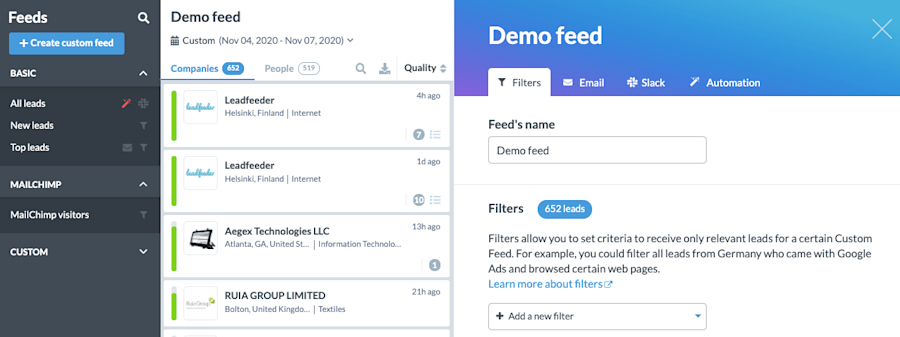
4. Engage in social selling
Yes, “selling” is key to the term “social selling.” But, the goal is not to slide into your prospect’s direct messages (DMs) with an overbearing pitch.
Instead, social selling is about leveraging your social networks to find the right contacts and develop lead nurturing relationships.
According to an internal study from LinkedIn, 78 percent of people who use social media for social selling outsell their peers.
Leadfeeder has an expansive database that provides social profiles of contacts to help you identify prospects and reach out.
How it works: With Leadfeeder’s robust database, sales reps can search for the social media profiles of key decision-makers. Use this information to fuel your research and engage in social selling methods.

5. Personalize sales outreach
Salesforce’s third edition of its State of Sales report found 72 percent of buyers expect personalized interactions with sales professionals.
Preheat your cold leads by using information from Leadfeeder to personalize your email templates or sales scripts.
Alternatively, you could monitor your web pages to send relevant marketing materials with your follow-ups based on the information the contact was browsing.
How it works: Use Leadfeeder custom feeds to segment data and develop communications based on that information.
For example, you could sort your leads using the “Page URL” filter and enter your pricing page’s URL.
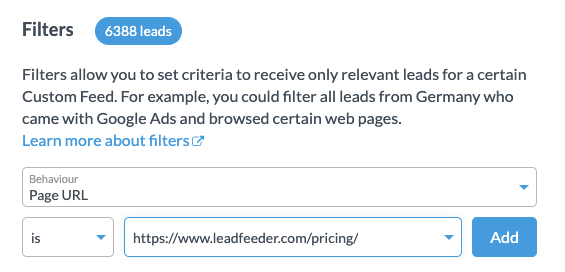
When reaching out to these leads, you could tailor your message to focus on your value proposition and include case studies to affirm your pricing model.
6. Improve sales prospecting efficiency
Another way to use Leadfeeder’s custom feeds is to create lead lists for each sales rep.
In doing so, you can improve sales prospecting efficiency by allowing each rep to focus only on the leads that matter to them.
How it works: Give each new custom feed the name of a sales rep and add filters to segment the right data into each pipeline.
Let’s say you have one sales rep who focuses on e-learning and another who focuses on education management.
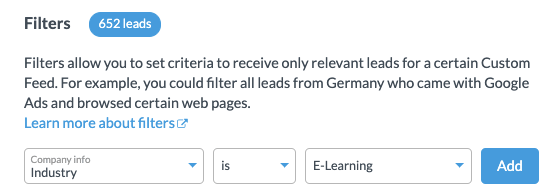
You can apply the “industry” filter and select the appropriate industry, so Leadfeeder only displays contacts in a specified realm for each salesperson.
Pro Tip: Integrate Leadfeeder with Slack to get alerted whenever a new lead is assigned to you.
7. Target key decision-makers
Skip the ole’ razzle-dazzle of cold outreach and finding the right contact before you can even start pitching.
Leadfeeder flips your sales process on its head and allows you to search its robust database of enriched company and contact information so you can find key decision-makers from the start.
How it works: As mentioned previously, Leadfeeder uses a combination of tools, such as databases and a tracker code.
8. Crush sales follow-ups
You’re busy. I get it.
We’ve all let an important follow-up slip through the cracks before.

With Leadfeeder, you don’t have to worry about missing another one.
Find out which leads have been emailed — and monitor who needs a follow-up.
How it works:
After logging in to your Leadfeeder dashboard, select + Create a custom feed > Leadfeeder activities > Emailed > yes/no.

9. Send prospect information to your CRM platform
Improve data quality and minimize redundant tasks.
Integrate your CRM platform with Leadfeeder to automatically sync things like deals, leads, and activities.
How it works: There are different steps depending on your CRM.
Leadfeeder works with:
Pipedrive
Salesforce
HubSpot CRM
webCRM
Zoho
Dynamics 365
10. Assign tags to leads for improved organization
The process of tagging leads helps you find essential data faster and keeps your sales process organized.
How it works:
Select a company from your list of leads and add a tag within the company details. Use ready-made tags (i.e., Competitor or Customer), or create a new tag (i.e., Hot Lead).

11. Automate email notifications for new leads
In sales, if you’re not first — you’re not just last, you’re most likely out of the game.
Admins of your Leadfeeder dashboard can enable email notifications so your sales reps receive a push notification whenever a new lead comes in.
This way, you’re able to optimize your timing for sales outreach.
How it works: Leadfeeder admins can enable email notifications through the dashboard and set it up to push daily or not at all.
Dope ways to use Leadfeeder for marketing teams
1. Develop accurate buyer personas
Sure, you probably have access to data about your buyers that you can use to build buyer personas — but how accurate is that data?
Leadfeeder is known for its data quality, providing more information than your average account-based marketing tool.
Examples of the information provided include:
Location
Industry
Company name
Company size
How it works: Use Leadfeeder to develop more accurate buyer personas by clicking on the lead in your dashboard to reveal enriched company details.
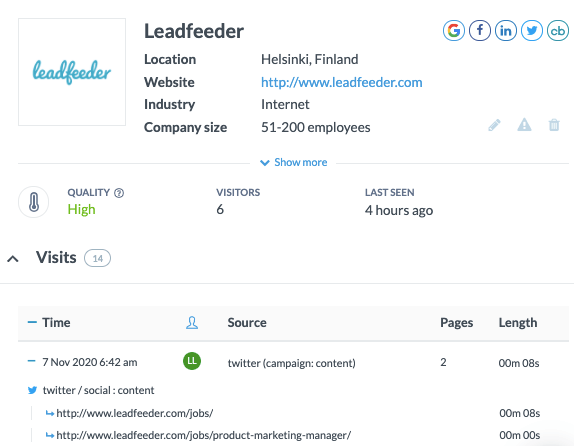

2. Optimize content marketing efforts
Leadfeeder gives you information about what web pages potential customers are viewing and for how long.
You can use it to optimize your content marketing materials or implement website personalization.
How it works: Implement the “Page URL” filter and combine it with “Visit length” to view leads who match the criteria.

3. Evaluate the effectiveness of partnerships
Leadfeeder allows you to segment leads by “Referring URL” — or the URL that contains an Urchin tracking module (UTM) code — to view leads from a specific company partnership.
This direct display allows you to see how many leads each partnership or collaboration is bringing in. Use that information to evaluate whether to partner with an organization again.
How it works: When creating a custom feed, click on Acquisition > Referring URL. Then, copy and paste the unique tracking link and click on the blue Add button.
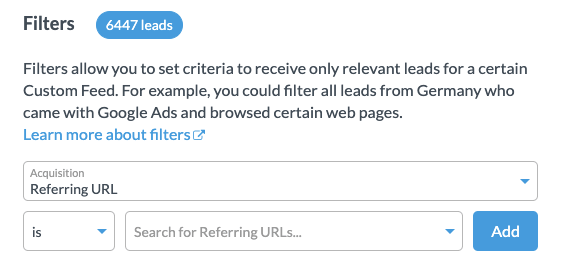
4. Simplify lead generation
According to HubSpot’s State of Marketing report, lead generation is the top priority for marketers.
Expand on your gated content pieces with Leadfeeder’s buyer intent data to simplify the lead generation process.
How it works: Leadfeeder shows you prospect information with no marketing action needed and fills your pipeline with accounts.

5. Send sales more qualified leads
Apply filters that match your lead criteria to pull in better-qualified contacts earlier in the sales process.
Your sales team will thank you.
How it works: Place Leadfeeder’s tracker code on your website and customize the feed with relevant filters.
6. Determine email campaign performance
Integrate Leadfeeder with your email service provider (ESP) to view email marketing filters, like “email campaign,” when creating a custom feed.
Segmenting data by email campaign allows you to see how many leads each effort brings in to determine performance — and refine strategies.
How it works: Connect Leadfeeder with your Mailchimp account, create a custom feed, then filter by email marketing > email campaign.
From there, you can type in the name of the specific email campaign.

Keep your eyes peeled for our ActiveCampaign integration!
7. Monitor client activity for upselling opportunities
Monitor current clients and see which web pages they’re viewing to find upsell opportunities.
How it works: Assign tags to notate current clients so you can easily access information on the web pages they’re peeping. 👀
8. Retarget on LinkedIn
Identify contact information for prospects who have viewed your website and create retargeting advertisements on LinkedIn to draw them in.
How it works: Add the LinkedIn Insight Tag to your website and make sure the tag has been verified. Then, integrate Leadfeeder with your Google Analytics account.
Use the contact details Leadfeeder provides to research the prospects on LinkedIn and create retargeting ads based on the data.
9. Reduce client churn
Use your buyer intent data to monitor target accounts by creating a “Competitor” feed in Leadfeeder.
This way, you can easily see if current clients are snooping around competitor websites and intervene with personalized follow-ups before it’s too late.
How it works: Import a list of competitors and create a custom feed using the “Company name” filter under company info.
10. Measure paid campaign outcomes
Use the “Source/Medium” filter to curate a custom feed for each paid marketing campaign so you can measure campaign performance and send leads to the proper sales reps.
How it works: Select + Create a custom feed > Acquisition > Source/Medium > search for the appropriate values and add the filter.
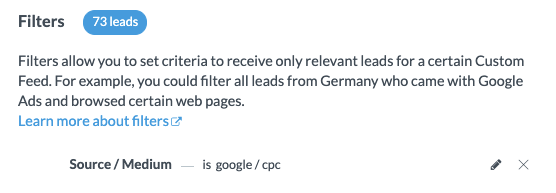
11. Analyze traffic sources
Create feeds dedicated to different key sources so you can analyze where your leads are coming from and better understand the buyer journey.
How it works: Select + Create a custom feed > Acquisition > Source — then select the source.
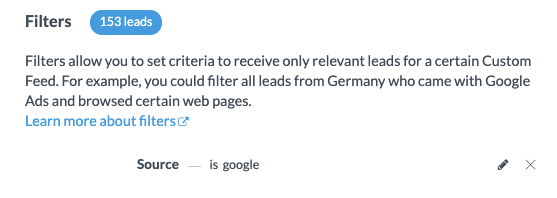
Final thoughts: 22 kick-ass ways sales & marketing teams can use Leadfeeder
Buyer intent data is the new lifeblood of sales and marketing — allowing you to uncover leads at the account level even when no contact information is provided.
Leadfeeder is a powerful sales and marketing tool that arms your company with the buyer intent data you need to increase your sales and improve your business.
It’s a match made in heaven. Don’t overthink it.
When it comes to use cases, there are endless possibilities for both sales professionals and B2B marketers. Discover some of the dopest ways to use Leadfeeder above.
Note: Ready to supercharge your sales and marketing teams with high-quality data? Start a free 14-day trial with Leadfeeder.
More leads, no forms.
Sounds too good to be true? It’s not. Identify companies already visiting your website and turn them into qualified leads to fuel your sales pipeline.
Show me how




